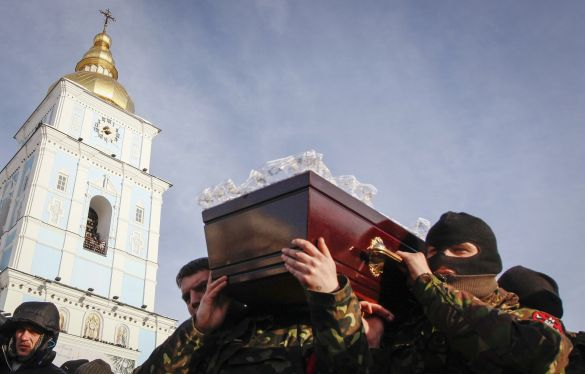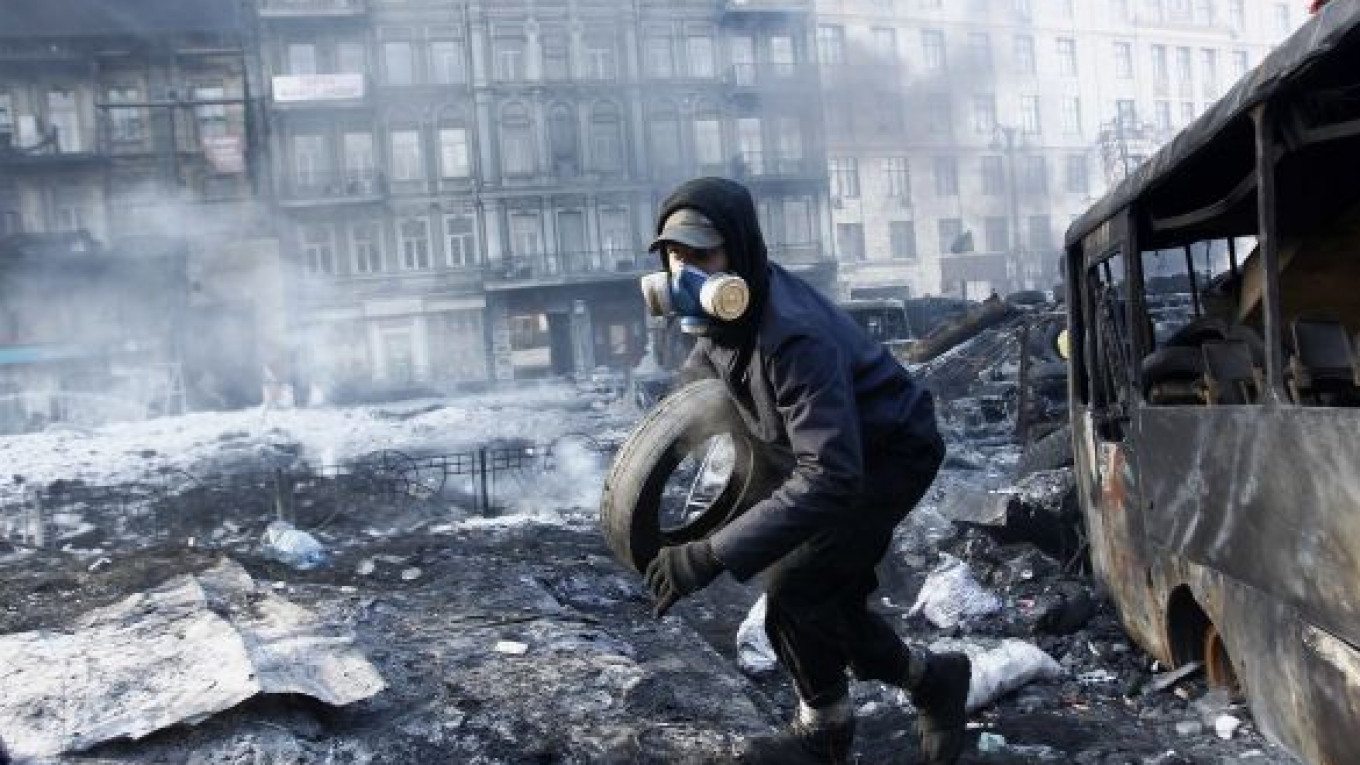KIEV — Thousands of Ukrainians chanted "Hero!" and sang the national anthem, as a coffin carrying a protester who was killed in last week's clashes with police was carried through the streets of the capital, underscoring rising tensions in the country's political crisis.
Mikhail Zhiznevsky, 25, was one of two protesters who died of gunshot wounds on Wednesday.
The opposition contends they were shot by police in an area where demonstrators had been throwing rocks and firebombs at riot police for several days. The government claims the two demonstrators were killed with hunting rifles, which they say police do not carry.
Meanwhile, protests against Ukrainian President Viktor Yanukovych continued to engulf the country, now spreading to central and eastern Ukraine, the leader's support base.
Zhiznevsky's body was being carried to the site of his death about 700 meters away, at barricades near the Ukrainian parliament. Prayers were also to be read at the nearby Independence Square in the center of the Ukrainian capital, where protesters have established a large tent camp and held demonstrations around the clock since early December. Sunday rallies in previous weeks have attracted especially large crowds, sometimes exceeding 100,000 people.
The protests began in late November after Yanukovych shelved a long-awaited agreement to deepen ties with the European Union, but they have been increasingly gripped by people seeking more radical action, even as moderate opposition leaders have pleaded for the violence to end.
A crowd late Saturday besieged a building, throwing fireworks, firebombs and rocks, near the protest tent camp where about 200 police were sheltering. By early Sunday morning a corridor was created, allowing police to leave.
Thousands of people were already in the square on Sunday afternoon, but opposition leaders may be betting that by not formally calling people together for a rally the event will be smaller.

Supporters carrying the coffin of protester Mykhailo Zhyznevsky in Kiev.
The overnight outburst came soon after opposition leaders issued a defiant response to Yanukovych's offer to make Arseny Yatsenyuk, one of their top figures, the country's prime minister.
The offer, coming as protester anger rises and spreads from the capital to a wide swath of the country, appeared to have been both a concession and an adroit strategy to put the opposition in a bind.
Accepting the offer could have tarred Yatsenyuk among protesters as a sell-out, but rejecting it could make him appear obdurate and unwilling to seek a way out of the crisis short of getting everything the opposition wants. Yanukovych also offered Vitali Klitschko, a boxing champion who has become a leader of the opposition, a deputy premiership.
While not rejecting the offer outright, Yatsenyuk said more of the opposition's demands must be met, including Yanukovych's resignation. He vowed protests will continue.
Yatsenyuk told the crowd at the main protest site that a special session of parliament called for Tuesday could be decisive. Yanukovych has said that session could discuss a government reshuffle and changes to the new anti-protest laws.
About half of Ukraine's people favored deeper integration with the EU, according to polls, and many Ukrainians widely resent Russia's long influence over the country.
He also said the opposition would demand that the government sign a free-trade agreement with the EU and release political prisoners, including former Prime Minister Yulia Tymoshenko.
In the past week, demonstrators have seized government administration buildings in a score of cities in western Ukraine, where Yanukovych's support is weak and desire for European ties is strong.
Zhiznevsky was from Belarus, a neighboring ex-Soviet country where hardline President Alexander Lukashenko has jailed and harassed his opponents. Vladimir Neklyaev, a Belarussian opposition leader, came to Kiev to bid farewell to Zhiznevsky.
"Ukraine is showing Belarus an example of how one should fight for freedom," Neklyaev said. "I am sure that our countries have a common future in Europe, where neither Ukrainians nor Belarussians will die."
Despite an offer to release activists and stop more persecutions, the government continued a crackdown, with more than 40 detained in the central city of Cherkasy after a protest, according to prosecutors.
A Message from The Moscow Times:
Dear readers,
We are facing unprecedented challenges. Russia's Prosecutor General's Office has designated The Moscow Times as an "undesirable" organization, criminalizing our work and putting our staff at risk of prosecution. This follows our earlier unjust labeling as a "foreign agent."
These actions are direct attempts to silence independent journalism in Russia. The authorities claim our work "discredits the decisions of the Russian leadership." We see things differently: we strive to provide accurate, unbiased reporting on Russia.
We, the journalists of The Moscow Times, refuse to be silenced. But to continue our work, we need your help.
Your support, no matter how small, makes a world of difference. If you can, please support us monthly starting from just $2. It's quick to set up, and every contribution makes a significant impact.
By supporting The Moscow Times, you're defending open, independent journalism in the face of repression. Thank you for standing with us.
Remind me later.






